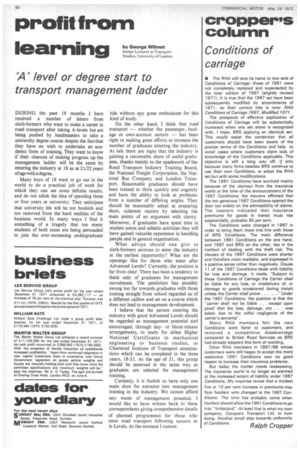profit from learning
Page 52

If you've noticed an error in this article please click here to report it so we can fix it.
'A' level or degree start to transport management ladder
by George Wilmot
Senior Lecturer in Transport Studies, University of London,
DURING the past 18 months I have received a number of letters from sixth-formers who want to make a career in road transport after taking A-levels but are being pushed by headmasters to take a university degree course despite the fact that they have no wish to undertake an academic form of training. They want to know if their chances of making progress up the management ladder will be the same by entering the industry at 18 as at 21/22 years of age with a degree.
Many boys of 18 want to go out in the world to do a practical job of work for which they can see some definite results, and do not relish the idea of spending three or four years at university: They anticipate that university life will be too bookish and too removed from the hard realities of the business world. In many ways I find it something of a tragedy that too many students of both sexes are being persuaded to join the ever-increasing undergraduate tide without any great enthusiasm for this kind of study.
On the other hand, I think that road transport — whether the passenger, haulage or own-account sectors — has been right in making great efforts to increase the number of graduates entering the industry. At last there are signs that the industry is gaining a reasonable share of useful graduates, thanks mainly to the spadework of the Road Transport Industry Training Board, the National Freight Corporation, the National Bus Company and London Transport. Reasonable graduates should have been trained to think quickly and cogently and have the ability to look at problems from a number of differing angles. They should be reasonably adept at preparing short, coherent reports by selecting the main points of an argument with clarity. Moreover, if 'graduates have spent time in student union and athletic activities they will have gained valuable experience in handling people and in general organization.
What adviFe should one give to sixth-formers anxious to enter the industry at the earliest opportunity? What are the openings like for those who enter after Advanced Levels? Currently, the position is far from clear. There has been a tendency to think only of graduates for management recruitment. The pendulum has possibly swung too far towards graduates with those coming straight from school regarded as of a different calibre and set on a course which does not lead to management development.
I believe that the person entering the industry with good Advanced Levels should be regarded as management potential and encouraged, through dayor block-release arrangements, to study for either Higher National Certificates in mechanical engineering or business studies. or Chartered Institute of Transport examinations which can be completed in the three years, 18-21. At the age of 21, this group should be assessed in the same way as graduates are selected for management training.
Certainly, it is foolish to have only one main door for entrance into management training in the industry. We cannot afford any waste of management potential. I would like to have written back to these correspondents giving comprehensive details
of planned programmes for those who enter road transport following success at A-Levels. At the moment I cannot




































































































